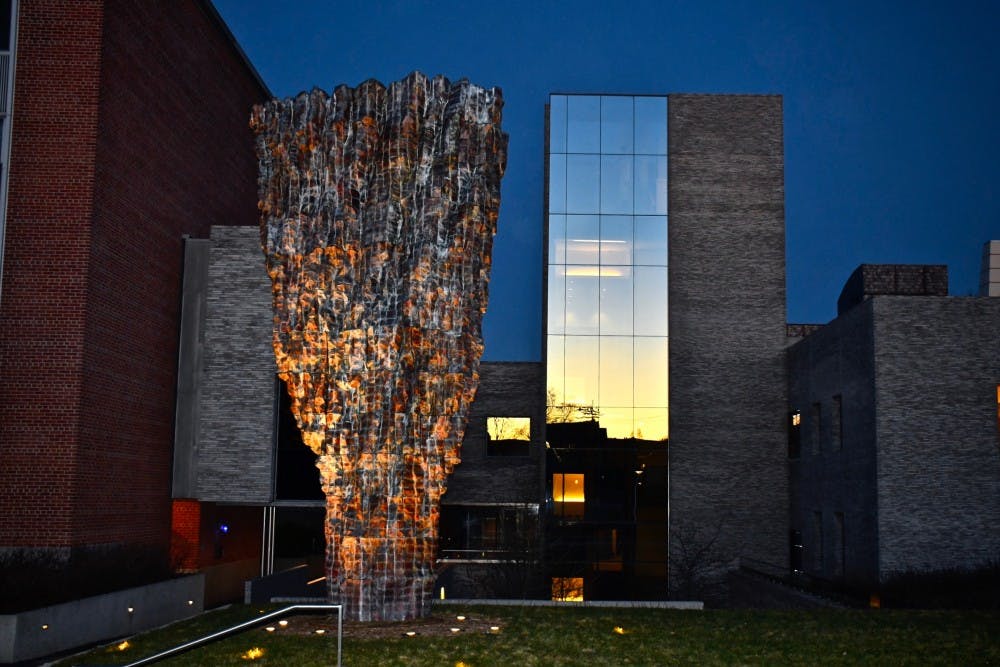This summer, I spoke with other interns at my organization who’d gotten a rude awakening on their rental bills: the benign “utilities” section had commonly amounted to a fifth, almost a fourth, of the monthly price, which they’d agreed to pay to their landlord.
“If only I hadn’t chosen to take such long, hot showers!” exclaimed one of them. Another lamented the hours he’d spent binging Netflix, allowing the TV to suck electricity deep into the night. Luckily for me, my landlord had chosen to include my utilities in my monthly price, but I still reflected on what the extra lightbulbs or ceiling fans I’d left on through the night would’ve cost me.
Here at Princeton, all of our utilities are included in our $10,000 room charge, meaning there is no financial reward for students to save water or electricity. This is creating some problems for the University as it attempts to reach its next climate change goal: reduce carbon emissions to 1990 levels by the end of next year.
Currently, emissions are hovering about 13 percent above the 1990 amount and have been for the past couple of years. What will push emissions over the edge, according to the Office of Sustainability, is if students consciously reduce their energy usage. But as an Ecology Representative (EcoRep), I’ve come to believe that many students won’t listen to voluntary policies or half-hearted encouragements.
What will make them listen? A campus “utilities” bill for each dorm room for both water and energy usage, which would incentivize students to implement minor lifestyle changes such as leaving their windows closed when the heat is on, using as few appliances as possible, and shortening their showers. This bill must not be a financial burden; therefore, the University should establish per capita baseline energy and water usages specific to each dorm building and automatically cover the costs for these baselines in the room charge (as is currently done).
Any usages above these baselines would be paid for by the student with certain exceptions available by application. For usages below these baselines, however, students can earn money back on their bill, allowing students who’d like to save money on their Princeton education while simultaneously helping the planet.
There is nothing stopping the University, however, from extending this “utilities” bill concept to apply to other resource-intensive activities. Laundry machines, for instance, could be equipped with prox readers to charge students if they choose less sustainable options, such as washing with hot water or running loads in the dryer on high heat (as opposed to line drying, which uses significantly less energy and can be better for your clothing). Preferred laundry practices, such as the first 30 minutes of drying on a low temperature or cold water washes, could still be given to students for free.
Instead of giving students an annual printing budget of 2,600 sheets for free, the University could charge students $0.10 per black-and-white sheet and $0.50 per color sheet, which could dramatically reduce the piles of paper waste which accumulate around the printers. Those who must print a significant number of documents for their major or specific classes could receive rebates, as could student organizations for printing flyers and publicity materials (USG and the Pace Center already offer free copier services to student groups).
None of these proposed fees should be regarded as cruel or unprecedented because in the real world, we will all have to pay for the electricity and hot water we use on our “utilities” bills, the loads of laundry we do at the laundromat, or the sheets of paper we print at the local office supply store. Even if we end up in a rental agreement where “utilities” are included, as I did this past summer, the planet will still be paying for our excessive resource consumption.
The practices that Princeton employs currently — to make every service free, regardless of the resources used — are cultivating a wasteful mindset among us undergraduates, which will end up costing us and the Earth more after graduation. Instead of allowing its students to be willfully ignorant within the Orange Bubble, the University should begin charging us on a usage basis, teaching us to be more conscientious and responsible citizens of this planet while helping us to save money in the long run.
Claire Wayner is a sophomore from Baltimore, Md, majoring in civil and environmental engineering. She can be reached at cwayner@princeton.edu.









